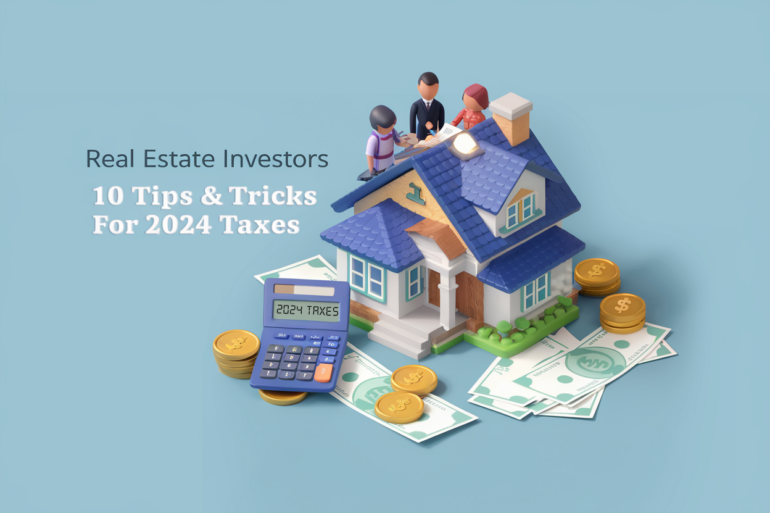10 Tips for Real Estate Investors to Prepare for 2024 Taxes
The new year is here, so it’s time to prepare for tax season. While taxes can be complicated, your filings provide numerous opportunities for deductions, credits, and other incentives. Smartly navigating your taxes can bring lucrative returns now and in the future. What can you do to stay ahead of the curve? Here are 10 tips and tricks for real estate investors preparing for 2024 taxes.
Avoid penalties by hiring a professional tax preparer.
1. Get Organized
First, getting organized is essential for your taxes. Waiting until the last minute to assemble your records can result in headaches and late tax filings. Punctuality and preparedness are paramount in real estate, so apply the same mindset in organizing your financial documents.
Keep detailed spreadsheets of all income you’ve earned from real estate investing in 2024. Then, you can make the final additions and be ready for filing once the new year arrives. The Internal Revenue Service (IRS) applies a 5% tax for every month your filing is late, so avoid this cost by being punctual.
2. Hire a Professional Tax Preparer
Being late with your tax filings is one thing, but it’s another to be incorrect. Correct calculations ensure you don’t underreport or overestimate your yearly income. The IRS assesses a 20% penalty if you underpay your taxes. While the IRS may be sympathetic, you must fork over the money if you neglect or disregard your filing.
Avoid these penalties by hiring a professional tax preparer. These experts know how to file everything correctly and navigate the complicated weeds of the IRS. Additionally, they’ll know what deductions and credits you’ll qualify for, justifying their expense.
Finding incentives is critical to getting the most out of your yearly taxes.
3. Look for Deductions
Your income can increase if you own numerous properties and businesses. Therefore, your tax liability will be higher than the average person’s. Consider these deductions when looking for ways to reduce your taxable income.
- Home office: Working remotely has become more common recently, opening many to the home office deduction. You can deduct this expense if your office is 300 square feet or under.
- Maintenance: You can take deductions for the maintenance you perform on rental properties. The IRS says you can deduct the cost of supplies, materials, repairs, and upkeep.
- Business expenses: Running a business means you have costs associated with your company. Fortunately, the IRS lets you deduct advertising, automobile, and legal fees, among others.
4. Rethink Your Capital Gains
Capital gains are integral to real estate investing, so ensure you get the most out of them for lucrative returns and less tax burdens. Many investors have aimed for short-term capital gains because of the hot seller’s market since 2020. However, it may be wise to rethink your approach.
It may be time to look at long-term capital gains if your area is moving into a buyer’s market. The properties you’ve held for over a year fall into this category and have a lower tax rate. Long-term capital gains usually see a tax between 0% and 15%, whereas short-term gains could see a tax of up to 37%.
5. Consider the 1031 Exchange
Finding incentives is critical to getting the most out of your yearly taxes. One you should pay attention to is the 1031 exchange. This term refers to section 1031 of the IRS code, letting real estate investors swap investment properties. After you sell a property, you can use the funds to purchase another while deferring the capital gains tax.
The 1031 exchange can be helpful for real estate investors specializing in flipping properties. However, it comes with some caveats to be aware of. For example, a neutral party must control the money you make off a sale and hold it in escrow. Additionally, the IRS must approve of the properties exchanged because it expects them to be like-kind.
6. Use the Qualified Opportunity Zone Funds
Another opportunity for incentives is using qualified opportunity zone (QOZ) funds. QOZs have been around since 2018, following the federal government instituting the Tax Cuts and Jobs Act. This program incentivizes building in IRS-deemed economically distressed areas by giving tax incentives.
You can take advantage of this incentive by using your capital gains to invest in QOZs. Thus, you can defer capital gains taxes if you reallocate the funds within 180 days. The deferment lasts until Dec. 31, 2026, or when you sell the property.
Being a self-employed real estate investor means you have slightly different tax rules.
7. Contribute to a Traditional IRA
You might not have a typical retirement plan if you’re a self-employed real estate investor. If you haven’t started saving, now is an excellent time because of the changes to IRA contributions. Those under 50 can contribute up to $6,500 in 2024 and $7,000 in 2024. With a traditional IRA, you’ll deduct your contributions and lower your taxable income.
Once you’ve opened an IRA, you should focus on long-term assets to ensure your savings beat inflation. While mutual funds and bonds carry some risk, they’ve historically provided investors with good returns.
8. Find Energy-Efficient Upgrades
Sustainability has become a sound environmental and business practice for real estate investors. The National Association of Realtors (NAR) says that 63% of its members emphasize energy efficiency in their property listings. Buyers want it, so real estate professionals adhere to their calls.
If you made energy-efficient upgrades to your properties, use these advantages on your tax filings. As of Jan. 1, 2023, the IRS allows a tax credit of up to $3,200 for improvements made through 2032.
9. Check the FICA Rules
Being a self-employed real estate investor means you have slightly different tax rules. The IRS says you must pay 15.3% of your income for Social Security and Medicare, but navigating what counts as income here is crucial.
For example, you may own properties with tenants paying monthly rent. You’ll file rental income on a Schedule E form, some of which may be FICA-exempt. You don’t have to pay FICA taxes unless your property is a business.
10. Plan for the Future
Real estate investing can bring lucrative gains over the years. Retirement may be decades away, but it’s never too early to plan for the future. Investors should know estate taxes and minimize liability for their heirs.
For example, you can hand your assets to your spouse once you pass. This action exempts you from estate taxes unless they are not an American citizen. Additionally, married couples can give their children tax-free gifts of up to $17,000 annually. Real estate investors should consider this option if they have kids and numerous properties.
Making Tax Season Easy
Tax season can cause headaches for real estate investors, but it doesn’t have to be complex. Savvy research and investing can make your tax liability lower and gains higher. Use these 10 tips to prepare your 2024 taxes.








